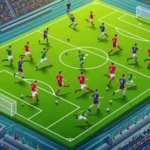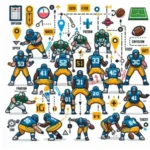Basketball is not just a game of speed and agility; it’s a strategic battle that requires sharp decision-making skills on every possession.
Whether you’re a seasoned player or just starting out, mastering the court means honing your ability to read the game, anticipate your opponent’s moves, and make split-second choices that can turn the tide of a match. In this comprehensive guide, we will delve into essential tips and techniques that will elevate your basketball IQ and enhance your decision-making skills. From understanding defensive formations to recognizing offensive opportunities, you’ll learn how to analyze the flow of the game and make informed choices that not only improve your individual performance but also elevate your team’s success. Get ready to take your game to the next level as we explore the intricacies of basketball strategy and the art of making the right call under pressure.
1. Understanding the Importance of Decision-Making in Basketball

In the fast-paced world of basketball, decision-making is akin to the heartbeat of the game. Every dribble, pass, and shot is a split-second choice that can alter the trajectory of the match. Understanding the importance of decision-making not only enhances your individual performance but also elevates your team’s overall play. A well-timed pass can create an open shot; an astute defensive read can disrupt the opponent’s offense. Thus, honing your decision-making skills is crucial for both personal growth and team success.
At its core, basketball is a dynamic sport filled with unpredictable variables. Players must constantly assess their surroundings: the positioning of teammates, the movements of defenders, and the ever-changing clock. each decision must be made with precision and clarity, often under immense pressure. This requires not just instinct, but also a deep understanding of the game’s fundamentals, strategies, and your own capabilities.
Moreover, effective decision-making is rooted in experience and situational awareness. Watching game footage, studying opponents, and practicing different scenarios can increase your basketball IQ, allowing you to anticipate plays before they unfold. As you develop this skill, you’ll find that your confidence on the court grows, enabling you to make bolder choices that can lead to game-winning moments.
In essence, mastering the art of decision-making in basketball can set you apart as a player. It transforms you from a reactive participant into a strategic player, capable of guiding your team through the complexities of the game. Whether you’re making a quick drive to the basket or orchestrating a play from the perimeter, your ability to make informed decisions will be a defining factor in your success on the court.
2. The Role of Court Awareness
Court awareness is a fundamental skill that separates the average player from a true basketball strategist. It’s more than just knowing where your teammates and opponents are positioned; it’s about developing an acute sense of space, timing, and the flow of the game. A player with high court awareness can anticipate plays before they unfold, allowing them to make quicker and more effective decisions.
Imagine dribbling down the court with the ball in hand. A player with strong court awareness will not only focus on the immediate actions in front of them but will also scan the entire court for opportunities. Are your teammates in advantageous positions? Is the defense shifting, providing openings for a quick pass? Can you spot a player cutting toward the basket? By regularly assessing these dynamics, you can make informed choices—whether it’s taking a shot, making a pass, or driving to the hoop.
To enhance your court awareness, practice situational drills that simulate game scenarios. Incorporate exercises that require you to make quick decisions under pressure. For instance, during scrimmages, focus on communicating with teammates and reading the defense. Developing this skill often involves an intuitive understanding of game mechanics and a strong sense of anticipation. The more you play, the better you will become at reading the game, allowing you to execute plays with precision and confidence.
In addition, watching film of yourself and others can be incredibly beneficial. Analyze how different players move and how they respond to various defensive setups. Do they make quick passes? Are they aware of open lanes? Taking the time to reflect on these aspects will not only improve your understanding of the game but will also enhance your ability to quickly assess situations as they arise on the court.
Remember, mastering court awareness is a continuous journey. The more you invest in understanding the game as a whole, the sharper your decision-making skills will become, ultimately elevating your performance and that of your entire team.
3. Developing a Strong Basketball IQ

Developing a strong basketball IQ is akin to sharpening a double-edged sword; it not only enhances your understanding of the game but also elevates your performance on the court. A high basketball IQ involves more than just memorizing plays or statistics—it’s about reading the game as it unfolds, anticipating opponents’ moves, and making split-second decisions that can turn the tide in your favor.
To cultivate this critical skill, start by immersing yourself in the fundamentals. Watch games—both professional and amateur—attentively analyzing player movements, defensive strategies, and offensive sets. Pay close attention to how players position themselves, communicate with teammates, and exploit weaknesses in the defense. Taking notes during games can help reinforce your learning and provide a valuable reference for future play.
Additionally, engage in game simulations through drills that mimic real-game scenarios. Partner with teammates to practice situational plays, such as late-game situations where you must decide whether to take a shot, pass, or foul. This will not only improve your tactical awareness but also boost your confidence under pressure.
Another vital aspect of developing basketball IQ is soliciting feedback. Discuss your decisions and thought processes with coaches and experienced players. Their insights can provide a fresh perspective on your gameplay and help you recognize patterns or tendencies you might overlook.
Finally, embrace a mindset of continuous learning. The game of basketball evolves, and so should your understanding of it. Stay updated on new strategies, training techniques, and player performances. By investing time and effort into developing your basketball IQ, you’ll empower yourself to make smarter decisions on the court, leading to improved performance and greater success in your game.
4. Analyzing Game Situations
When it comes to mastering basketball, decision-making is as crucial as shooting accuracy or defensive prowess. Analyzing game situations allows players to develop a keen sense of awareness on the court, enabling them to make split-second choices that can change the outcome of a game.
To enhance this skill, start by immersing yourself in various game scenarios during practice. Whether it’s a fast break, a half-court set, or a late-game situation, simulate these conditions to help you understand the dynamics at play. For instance, consider the positioning of teammates and opponents, the time remaining on the clock, and the score. Each situation requires a unique approach—are you looking to maintain possession, create an open shot, or force a turnover?
Take the time to break down film from your games or watch professional matches. Pay attention to how seasoned players read the court. Notice their body language, how they communicate with teammates, and their decision-making processes under pressure. This analysis can provide invaluable insights into how to handle similar situations in your own gameplay.
Additionally, practice mindfulness techniques to improve your focus during games. Staying calm amidst the chaos of a high-stakes moment can be the difference between a successful play and a missed opportunity. By honing your ability to analyze game situations, you not only enhance your decision-making skills but also elevate your overall performance on the court. Remember, every game is a learning experience, so embrace the challenge and be proactive in your development. The more you understand the nuances of the game, the more effective you’ll become as a player.
5. The Art of Anticipation: Reading Defenses

The ability to read defenses is a crucial skill for any basketball player aspiring to elevate their game. Mastering the art of anticipation can transform you from a reactive player into a strategic one, allowing you to make smarter decisions under pressure. When you learn to anticipate how defenses will react to your movements, you not only gain a competitive edge but also enhance your overall gameplay.
Start by observing the defenders’ positioning and body language. Are they leaning one way or another? This subtle shift can signal their next move, whether they’re preparing to close out on a shooter or shift to help another player. Pay attention to the defender’s eyes; they often reveal intentions. If a defender is glued to their assignment, it might indicate they’re anticipating a pass. Conversely, if they seem distracted, it may be an opportunity to exploit.
Another key element to reading defenses is understanding common defensive schemes. Familiarize yourself with concepts like man-to-man and zone defenses, as each brings unique challenges and opportunities. In a zone defense, for example, players may be more susceptible to cuts and quick ball movement. Recognizing these patterns will allow you to make quicker decisions on whether to drive, pass, or shoot.
Practice makes perfect when it comes to anticipation. During drills, simulate game scenarios where you must read the defense and react accordingly. Play against players who challenge your decision-making skills, pushing you to think one step ahead. Over time, you’ll develop a keen sense of when to make your move, ultimately leading to better shot selection and playmaking abilities.
Remember, effective communication with teammates also plays a vital role in your decision-making process. Establishing a rhythm and understanding with your fellow players will help you anticipate their movements and decisions, creating a seamless flow on the court. By honing your ability to read defenses, you’ll not only enhance your decision-making skills but also inspire confidence in your teammates, elevating the entire team’s performance.
6. Quick Decision-Making: Practice Drills
Quick decision-making is a pivotal skill that can elevate your basketball game from good to great. In the fast-paced world of basketball, the ability to make split-second decisions can often be the difference between a victory and a loss. To sharpen this crucial skill, incorporating specific practice drills into your training routine is essential. Here are some effective drills designed to enhance your decision-making abilities on the court.
**1. The 3-on-2 Fast Break Drill:** This drill simulates a fast-break scenario where players must quickly assess their options and make decisions under pressure. Set up two offensive players against three defenders. The offensive players must decide whether to attack the basket, pass to a teammate, or kick the ball out for a three-point shot. This drill helps players develop an instinct for reading defenses and making quick decisions while on the move.
**2. Closeout Drill:** In this drill, defenders practice closing out on the offensive player with the ball. As the defender approaches, the offensive player must quickly decide whether to shoot, dribble, or pass. This drill not only improves decision-making but also enhances defensive skills, as players learn to anticipate the offensive player’s moves and react accordingly.
**3. The “What Would You Do?” Scenario:** This drill involves a coach or teammate calling out different game scenarios, such as “You’re down by three with 10 seconds left, what do you do?” Players must verbally or physically respond with their decision-making process. This exercise encourages players to think critically and rehearse their responses to various game situations, ultimately improving their in-game decision-making.
**4. Reaction Time Drills:** Using tools like reaction balls or agility ladders, players can work on their overall agility and quickness while also practicing decision-making. For instance, you can set up a series of colored cones and assign specific actions (e.g., pass, shoot, or dribble) to each color. As players navigate through the cones, they must quickly determine their next move based on the color they encounter.
Incorporating these drills into your training regimen will not only enhance your quick decision-making skills but also build confidence in your ability to make the right choices when it counts the most. Remember, the more you practice under pressure, the more instinctive your decision-making will become on the court. Embrace these drills, and watch as your basketball IQ and performance soar!
7. Communicating Effectively with Teammates

Effective communication on the basketball court can be the difference between a well-executed play and a missed opportunity. As the game unfolds in real-time, every player must convey their intentions clearly and promptly to ensure that the team operates as a cohesive unit. This involves more than just shouting instructions; it requires a blend of verbal cues, body language, and an understanding of each teammate’s playing style.
Start by establishing a common language with your teammates. This could be a set of code words or hand signals that signal specific plays or movements. During practice, take the time to discuss and rehearse these signals so everyone is on the same page when the pressure mounts in a game.
In the heat of competition, eye contact becomes a powerful tool. A quick glance can communicate a lot—whether you’re looking to pass, cut, or set a screen. Furthermore, be proactive in communicating not just what you want to do, but also what you see happening on the court. Phrases like “I’ve got your back!” or “Watch the pick!” can help keep everyone informed and engaged, fostering a sense of unity and trust.
Listening is equally crucial. Effective communication is a two-way street; acknowledging your teammates’ calls and feedback can enhance decision-making and lead to better plays. By encouraging an open dialogue, you create an environment where teammates feel comfortable sharing their thoughts and suggestions.
Remember, the best teams are those that can adjust and adapt mid-game. By maintaining a steady stream of communication, you empower your team to react swiftly to changing circumstances, enhancing not only individual decision-making but also overall team performance. Ultimately, mastering the art of communication on the court will not only improve your basketball IQ but will also elevate your game and that of your teammates.
8. Managing Pressure and Staying Composed
Managing pressure and staying composed on the basketball court can often be the difference between a win and a loss. The fast-paced nature of the game, combined with the constant noise of the crowd and the intensity of competition, can create moments of high tension where decision-making is crucial. To master this aspect of the game, players must cultivate a mindset that allows them to thrive under pressure.
One effective way to develop this composure is through practice scenarios that simulate game-like pressure. Incorporating drills that mimic high-stakes situations—such as last-second shots or critical turnovers—can help players learn to maintain their focus and make sound decisions even when the stakes are at their highest. Regularly exposing yourself to these scenarios will train your brain to respond calmly, rather than panic, when the pressure is on.
Visualization techniques can also be beneficial. Before games, take a few moments to visualize yourself successfully navigating high-pressure situations. Picture the crowd roaring as the clock ticks down, and see yourself making the right pass, taking the perfect shot, or drawing the foul. This mental rehearsal can enhance your confidence and preparedness, allowing you to perform at your best when it truly matters.
Furthermore, cultivating a solid support system on the court can help ease the burden of pressure. Communication with teammates is key; knowing that you have reliable players around you can foster a sense of security. Establishing trust and understanding among teammates will not only enable you to make better decisions but also encourage a collective composure that benefits the entire team.
Lastly, remember to breathe. It sounds simple, but in the heat of the moment, we often forget to take a deep breath. Developing the habit of pausing for a quick inhale and exhale can help reset your mind and body, allowing you to regain clarity and focus before making pivotal decisions. By mastering pressure management and composure, you’ll elevate your game and become a more effective and confident player on the court.
9. Learning from Mistakes: Post-Game Analysis
Learning from mistakes is a critical component of improving your basketball decision-making skills, and conducting a thorough post-game analysis can be a game changer. After each match, take the time to reflect on your performance—this isn’t about dwelling on failures but rather about transforming insights into actionable strategies for improvement.
Start by reviewing game footage, if available. Watching yourself play can provide invaluable perspective; it allows you to see the decisions you made in real-time and evaluate their outcomes. Were you too quick to shoot, or did you pass when you had a clear path to the basket? Did you miss defensive assignments that led to easy points for the opposition? Pay close attention to pivotal moments in the game—those split-second choices can often reveal patterns in your decision-making that need adjustment.
Additionally, consider maintaining a basketball journal. After each game, jot down your thoughts on what went well and what didn’t. This practice not only reinforces your learning but also helps to track your progress over time. By categorizing your experiences—such as offensive plays, defensive strategies, and team dynamics—you can identify specific areas that require focus in future practices.
Engaging in discussions with coaches and teammates can also enrich your analysis. They may offer perspectives you hadn’t considered, or point out strengths and weaknesses in your play that you might have overlooked. Constructive feedback is an essential tool in any athlete’s development.
Finally, remember that every mistake is an opportunity for growth. Use your post-game analysis as a stepping stone, not a stumbling block. By adopting a mindset that values learning over perfection, you’ll enhance your decision-making skills, ultimately leading to better performance on the court. Mastering the art of reflection and analysis will not only elevate your game but also deepen your understanding of basketball as a whole.
10. Incorporating Video Analysis into Practice
Incorporating video analysis into your basketball practice can be a game-changer for enhancing your decision-making skills on the court. This powerful tool allows players to gain insight into their performance from a new perspective, highlighting areas for improvement and reinforcing successful strategies. By recording practice sessions or games, you can dissect your movements, analyze your decision-making processes, and understand the consequences of your choices in real time.
When reviewing footage, pay close attention to your positioning, shot selection, and overall game flow. Are you making quick decisions under pressure? Are you effectively reading the defense and anticipating their moves? Video analysis enables you to slow down the action, allowing you to spot mistakes that you might miss in the heat of the moment. Consider focusing on specific scenarios, such as pick-and-roll situations, fast breaks, or defensive assignments, to dissect your reactions and choices more thoroughly.
Moreover, sharing this footage with coaches or teammates can foster constructive discussions about strategy and execution. They may offer fresh perspectives on your gameplay, helping you to identify blind spots or alternative approaches. Collaborating in this way not only builds team cohesion but also encourages a culture of continuous improvement.
Incorporating video analysis into your practice regimen doesn’t require sophisticated technology; even a smartphone can do the trick. The key is to make it a regular part of your training, setting aside time to review and reflect on your performances. By embracing this method, you’ll not only enhance your basketball IQ but also develop a more nuanced understanding of the game, ultimately leading to better decision-making on the court. As you become more adept at analyzing your gameplay, you’ll find that your confidence and ability to make split-second decisions will soar, making you a more formidable player.
11. Leveraging Feedback from Coaches
One of the most invaluable resources at your disposal as a basketball player is the feedback from your coaches. These seasoned mentors have a wealth of knowledge and experience, and their insights can significantly enhance your decision-making skills on the court. When you engage with your coaches, you unlock a treasure trove of strategic advice tailored to your unique playing style and the dynamics of your team.
To leverage this feedback effectively, it’s essential to approach your coaches with openness and a willingness to learn. After games or practices, take the time to seek constructive criticism. Ask specific questions about your decision-making in crucial moments—were there better options you could have considered? Did you recognize the defensive setup correctly? By delving into these discussions, you can better understand your strengths and pinpoint areas for improvement.
Moreover, consider recording your games or practices and reviewing them alongside your coach. This visual feedback allows you to see your choices in real-time, providing a clear context for their effectiveness. Your coach can highlight pivotal moments where alternative decisions could have altered the outcome, fostering a deeper understanding of situational basketball.
Additionally, don’t hesitate to request feedback during practice drills. Coaches often design these exercises to simulate game scenarios, making them perfect opportunities to test your instincts and decision-making under pressure. By actively engaging in discussions during these drills, you can refine your thought process, enabling you to react more swiftly and effectively during actual games.
Ultimately, leveraging feedback from your coaches is about creating a dialogue that encourages growth. By actively seeking their insights and embracing their critiques, you position yourself to not only enhance your decision-making skills but also to become a more well-rounded and strategic player on the court. Remember, the path to mastering basketball is a collaborative journey—so take advantage of the guidance available to you!
12. The Impact of Physical Conditioning on Decision-Making
Physical conditioning plays a pivotal role in enhancing your basketball decision-making skills. When you’re in peak physical shape, your body responds more efficiently to the demands of the game. This heightened level of fitness not only improves your stamina but also sharpens your mental acuity, allowing you to make quicker and more informed decisions on the court.
Consider this: during a high-intensity game, when fatigue sets in, your brain’s ability to process information diminishes. You may find yourself hesitating or making impulsive choices that can lead to costly turnovers or missed opportunities. However, when you invest time in conditioning—whether through endurance training, strength workouts, or agility drills—you build a robust foundation that enables your body to perform at its best for longer periods.
Moreover, physical conditioning enhances your awareness of your surroundings. A well-conditioned athlete is more likely to anticipate plays, read defenses, and react to the movements of teammates and opponents with lightning speed. This proactive approach to the game allows for split-second decisions that can change the outcome of a match.
Incorporating exercises that mimic game scenarios into your training, such as reaction drills or small-sided games, can further refine your decision-making skills. These drills not only enhance your physical capabilities but also create a mental framework that prepares you for the dynamic nature of basketball.
Ultimately, the synergy between physical conditioning and decision-making is undeniable. By prioritizing your fitness training, you will equip yourself with the endurance, strength, and confidence necessary to make smarter plays and elevate your overall game. So lace up your sneakers, hit the gym, and prepare to see not only your physical performance soar but your decision-making skills reach new heights on the court.
13. Building Confidence Through Repetition
Building confidence through repetition is a cornerstone of becoming a formidable player on the basketball court. Just like any skill, decision-making in basketball improves with practice, and the more you put yourself in game-like situations, the more instinctual your choices will become.
Imagine standing at the three-point line, a defender closing in, and only a split second to decide whether to shoot, pass, or drive. This moment can be overwhelming for even seasoned players, which is why familiarity is key. By repeatedly practicing various scenarios—whether through drills, scrimmages, or even watching game film—you condition your brain to recognize patterns and make quicker, more effective decisions under pressure.
Incorporate drills that simulate game situations where you must choose between multiple options. For instance, practice executing a pick-and-roll, then immediately assess whether to take the shot, make the pass, or drive towards the basket. As you repeat these scenarios, your confidence will swell; you’ll start to trust your instincts and react without second-guessing yourself.
Moreover, seek feedback from coaches or experienced players during these sessions. Their insights can help refine your thought process and decision-making strategies, reinforcing your confidence even further. Remember, confidence isn’t just about feeling good; it’s about knowing that you can rely on your skills when it matters most. With time and commitment to repetition, you’ll find that your decision-making improves, leading to more successful plays and, ultimately, a significant boost in your overall game performance.
14. Case Studies: Decision-Making in Professional Games
Analyzing decision-making in professional basketball games provides invaluable insights into how top players navigate high-pressure situations. By studying specific case studies, you can gain a deeper understanding of the strategic choices made during pivotal moments and apply these lessons to your own game.
Take, for instance, the 2016 NBA Finals, where the Cleveland Cavaliers faced off against the Golden State Warriors. In Game 7, with less than two minutes remaining and the score tied, LeBron James made a critical decision to drive towards the basket. He drew the attention of multiple defenders, causing a momentary shift in their defensive alignment. Instead of forcing a contested shot, he made the astute choice to kick the ball out to Kyrie Irving, who knocked down a crucial three-pointer that ultimately turned the tide of the game. This decision not only showcased LeBron’s ability to read the defense but also his trust in his teammates—an essential aspect of effective decision-making on the court.
Another compelling example comes from the 2020 NBA Playoffs when the Miami Heat faced the Milwaukee Bucks. In a decisive Game 1, Jimmy Butler exhibited remarkable poise under pressure. With the shot clock winding down and the Heat trailing, he chose to create a high-percentage shot rather than rush a three-pointer. His patience and court awareness paid off as he drew a foul and converted two free throws, allowing Miami to stay in contention. This highlights the importance of maintaining composure and making calculated decisions, even in the most critical moments of a game.
By dissecting these real-world scenarios, you can learn the importance of timing, teamwork, and strategic thinking. Observe how these elite athletes weigh their options, consider their surroundings, and execute their decisions with precision. Practicing these principles in your own games will not only enhance your decision-making skills but also elevate your overall performance on the court. Remember, mastery comes from understanding the game at a deeper level, and studying these case studies is a powerful way to start that journey.
15. Conclusion: Becoming a Smart Player on the Court
In conclusion, becoming a smart player on the court is not just about mastering the physical skills of basketball; it’s equally about honing your decision-making abilities. As we’ve explored throughout this guide, effective decision-making can transform your game, allowing you to anticipate plays, read defenses, and make strategic moves that elevate both your performance and that of your teammates.
To become a smart player, cultivate the habit of analyzing every game—not just your own but also professional matches. Observe the choices players make in various scenarios and consider the reasoning behind their actions. Use this knowledge to inform your decisions during practice, where you can experiment with different approaches in a pressure-free environment.
Additionally, embrace the importance of communication. Basketball is a team sport, and being able to convey your thoughts and intentions to your teammates will create a more cohesive unit. Never underestimate the power of a well-timed call or a subtle gesture; these can be the difference between a successful play and a missed opportunity.
Finally, remember that growth takes time. Be patient with yourself as you work to enhance your basketball IQ. Embrace failures as learning experiences, and remain open to feedback from coaches and peers. With dedication and an unwavering commitment to improvement, you’ll not only become a smarter player but also gain the respect of those around you on and off the court. Mastering basketball decision-making is a journey, and every step you take will bring you closer to becoming the player you aspire to be.
As we wrap up our exploration of enhancing your basketball decision-making skills, remember that mastery on the court comes not just from physical prowess but also from strategic thinking and quick judgment. The tips we’ve shared—ranging from honing your court awareness to cultivating a strong understanding of game dynamics—are designed to empower you to make smarter choices when it counts. Embrace every practice session as an opportunity to refine these skills, and don’t hesitate to analyze your gameplay to identify areas for improvement. With dedication and the right mindset, you’ll find yourself not only elevating your performance but also becoming a more valuable teammate. So lace up your sneakers, hit the court, and start making decisions that will lead you and your team to victory!






